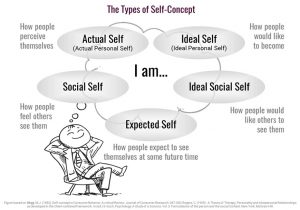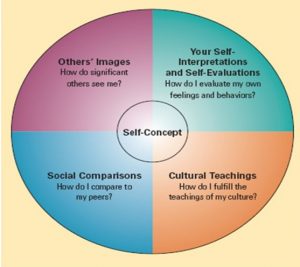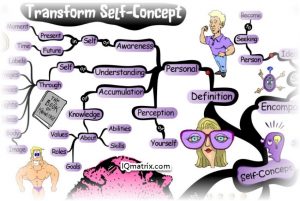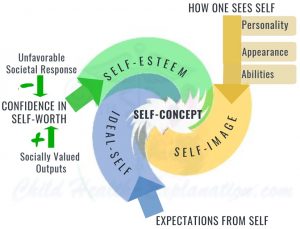Self-concept is an overarching idea we have about who we are—physically, emotionally, socially, spiritually, and in terms of any other aspects that make up who we are (Neill, 2005).
We form and regulate our self-concept as we grow, based on the knowledge we have about ourselves. It is multidimensional, and can be broken down into these individual aspects.
For example, you may have a very different idea of who you are in terms of your physical body, and who you are in terms of your spirit or soul.
The influential self-efficacy researcher Roy Baumeister (1999) defines self-concept as follows:
“The individual’s belief about himself or herself, including the person’s attributes and who and what the self is.”
◦A similar definition comes from Rosenberg’s 1979 book on the topic; he says self-concept is:
“…the totality of an individual’s thoughts and feelings having reference to himself as an object.”
Self-concept is related to several other “self” constructs, such as self-esteem, self-image, self-efficacy, and self-awareness. In the following section, we will explain these slight—yet important—differences.
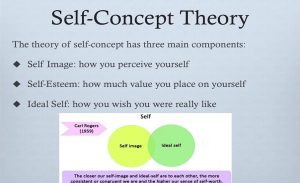
Self-Concept vs. Self-Esteem
Self-concept is not self-esteem, although self-esteem may be a part of self-concept. Self-concept is the perception that we have of ourselves, our answer when we ask ourselves the question “Who am I?”
It is knowing about one’s own tendencies, thoughts, preferences and habits, hobbies, skills, and areas of weakness.
According to Carl Rogers, founder of client-centered therapy, self-concept is an overarching construct that self-esteem is one of the components of it (McLeod, 2008).
Self-Concept vs. Self-Efficacy
Self-concept is a more complex construct than self-efficacy.
While self-efficacy refers to an individual’s judgments of their own abilities, self-concept is more general and includes both cognitive (thoughts about) and affective (feelings about) judgments about oneself (Bong & Clark, 1999).
Self-Concept vs. Self-Awareness
Self-awareness also influences self-concept. It is the quality or trait that involves conscious awareness of one’s own thoughts, feelings, behaviors, and traits (Cherry, 2018A).
To have a fully developed self-concept (and one that is based in reality), a person must have at least some level of self-awareness.
Self-Concept Theory
There are many theories about what exactly self-concept is and how it develops. Generally, theorists agree on the following points:
- On the broadest level, self-concept is the overall idea we have about who we are and includes cognitive and affective judgments about ourselves.
- Self-concept is multi-dimensional, incorporating our views of ourselves in terms of several different aspects (e.g., social, religious, spiritual, physical, emotional).
- It is learned, not inherent.
- It is influenced by biological and environmental factors, but social interaction plays a big role as well.
- Self-concept develops through childhood and early adulthood when it is more easily changed or updated.
- It can be changed in later years, but it is more of an uphill battle since people have established ideas about who they are.
- Self-concept does not always align with reality. When it does, our self-concept is “congruent.” When it doesn’t, our self-concept is “incongruent.” (Cherry, 2018B; Gecas, 1982).
Identity and Self-Concept Theory in Psychology vs. Self-Concept in Sociology
Both psychology and sociology share an interest in self-concept, but they use slightly different ways to explore it. Individual researchers vary, of course, but generally, the divide can be thought of in these terms:
Sociology/social psychology focuses on how self-concept develops, specifically within the context of the individual’s social environment.
Psychology focuses on how self-concept impacts people (Gecas, 1982).
There are other differences between the two, including psychology’s general focus on the individual versus sociology’s focus on the group, community, or society; however, this difference in focus has led to two diverse research streams. Both have resulted in great insights and interesting findings, and they sometimes overlap, but this divide can still be seen in the literature today.
The Components and Elements of the Self-Concept Model
There are different ideas about what self-concept consists of, and how it should be defined; however, there are some characteristics and dimensions that apply to the basic, agreed-upon conceptualization of self-concept.
Characteristics of Self-Concept
As a brief review, self-concept is the perspective we have on who we are. Each of us has a unique self-concept, different from the self-concept of others and from their concept of us.
However, there are some characteristics that all of our self-concepts have in common.
Self-concept:
- Displays uniquely with each person.
- Vary from very positive to very negative.
- Carries emotional, intellectual, and functional dimensions.
- Changes with the context.
- Changes over time.
- Influence the individual’s life (Delmar Learning, n.d.)
Dimensions of Self-Concept
Different dimensions may constitute different kinds of self-concept; for example, the dimensions that create “academic self-efficacy” will not have as much overlap with “social self-efficacy.”
There are some overarching dimensions that researchers understand with the self-concept puzzle. These dimensions include:
- Self-esteem
- Self-worth
- Self-image (physical)
- Ideal self
- Identities or roles (social)
- Personal traits and qualities (Elliot, 1984; Gecas, 1982)
